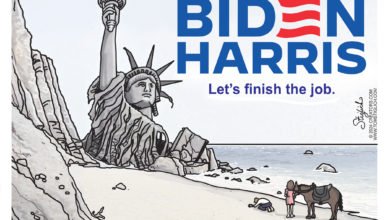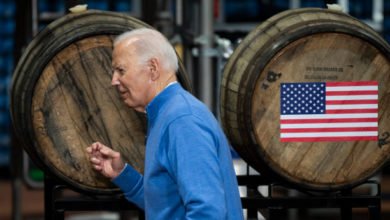China, Russia And Iran Rush To Fill The American Leadership Void

A bizarre series of new and/or deepened relationships around the world — often including countries that had long been at odds or at war — has emerged in the past twelve months. Take a deep breath and look around: China-Saudi Arabia, China-Iran, Israel-China, Tesla-China, China-Democratic Republic of Congo (DRC), Brazil/Venezuela/Cuba-China. Saudi Arabia-Syria, Saudi Arabia-Israel, Iran-Saudi Arabia, Saudi Arabia-Palestinian Authority, Iran-Iraq, Russia-Iran, Iran-Venezuela/Cuba/Nicaragua, Russia-Israel, Japan-South Korea, Japan-Russia.
Every single one and the consequences they produce are the result of the clear withdrawal of the United States as the lynchpin of relations and alliances on the world stage — with the exception of pouring billions of dollars’ worth of weapons into Ukraine — has created a vacuum in the Middle East, South America and Africa. Into every vacuum pours … well … nothing good.
Side Story: Israel’s experience with territorial vacuums can be seen clearly in Lebanon. Withdrawing from southern Lebanon to the UN line in 2000 was supposed to lead to more peaceful bilateral relations since Israel no longer controlled Lebanese territory. However, the Christian forces of the South Lebanese Army (SLA) weren’t enough to hold the space, and Iranian proxy Hezbollah filled the vacuum. Israel’s withdrawal from Gaza in 2005 removed the IDF. With no IDF and no Israeli citizens in the Strip, Iranian proxy Hamas filled the vacuum. Israel remains in Judea and Samaria by right but also because it is clear that the PA cannot hold the territory in the absence of the hand of the IDF.
The US plays on a bigger stage.
The Middle East was long the sphere of influence of Great Britain, which maintained freedom of the seas, security for the export of oil, and more or less managed relations among states. The US took over in the 1950s and has remained there ever since — sometimes the hidden hand, sometimes in the open. The US first tried and failed to covertly create a “Northern Tier” of states south of the Russian border. But it collaborated openly with the Saudis and Iranians to secure oil shipping in the Red Sea and Persian Gulf and provide security for them and others. The US also established close relations with Israel, protected the Shah of Iran to a point, brokered peace deals, protected the Lebanese government to a point, rescued Kuwait, overthrew the Taliban and Saddam, and tried to midwife the so-called “Arab Spring.”
Like every empire, the US had serious failures, chief among them the 1956 Suez War, the Lebanon crisis of 1958, and the 1978 debacle in Iran. More recently, the failures of the Arab Spring; the aftermath of the Iraq war and the precipitous American withdrawal; the Syrian civil war; and the extraordinarily ugly, backstabbing, and deadly withdrawal from Afghanistan, were signs that the US had enough of the region and wanted out.
In another sphere, President Barack Obama’s Secretary of State John Kerry’s revocation of The Monroe Doctrine told Cuba, Nicaragua, and Venezuela that they were safe in their relations with Russia, then with Iran, and increasingly with China. Brazil’s new government has jumped at the chance to “diss” the Biden administration both by allowing an Iranian tanker to dock in Rio and by telling Beijing that Brazil might be amenable to dethroning the dollar as the world’s reserve currency.
Side story: For all of the planning, coaxing and demanding that the administration is doing to move America’s future to EVs, there appears to be little understanding of how or where the batteries that will power the cars are made. (See White House Press Secretary Karine Jean-Pierre.)
The three largest producers of lithium are China, Chile and Australia, but in 2021, 79% of all lithium-ion batteries that entered the global market were produced in China, which also control 61% of global lithium refining for battery storage and electric vehicles and 100% of the processing of natural graphite used for battery anodes. Chile has announced that it is about to nationalize its lithium industry — which could be good for the US, or not, depending. In addition, the DRC supplies about 70% of the world’s cobalt, another essential mineral, but 80% of its industrial cobalt mines are owned or financed by Chinese companies.
Any wonder that Tesla built a plant in Shanghai?
China is not a “hidden hand.” It is openly working to align its domestic and international interests, including showing its military capabilities by militarizing islands in the Pacific and threatening Taiwan. When it turns to other countries, it doesn’t talk about “rights” or “democracy” or “global climate change.” (Compare that to US Secretary of State Antony Blinken’s proud announcement that, “I press the Saudis on LGBTQI issues in every conversation.” Or slamming Israel over the internal issue of judicial reform.)
At various levels, countries may or may not agree with China’s view of the world or its internal controls. But at various levels, it doesn’t matter. If you have to survive, have to manage your relations under difficult circumstances, and have to sell your products, what matters is that the world’s foremost democracy — the United States — has backed off and left China, Russia, and Iran as the go-to powers.
Countries are going to them.
The hand isn’t hidden because it doesn’t have to be.
Shoshana Bryen is Senior Director of The Jewish Policy Center and Editor of inFOCUS Quarterly.
The views and opinions expressed in this commentary are those of the author and do not reflect the official position of the Daily Caller News Foundation.
Content created by The Daily Caller News Foundation is available without charge to any eligible news publisher that can provide a large audience. For licensing opportunities of our original content, please contact licensing@dailycallernewsfoundation.org
Agree/Disagree with the author(s)? Let them know in the comments below and be heard by 10’s of thousands of CDN readers each day!




